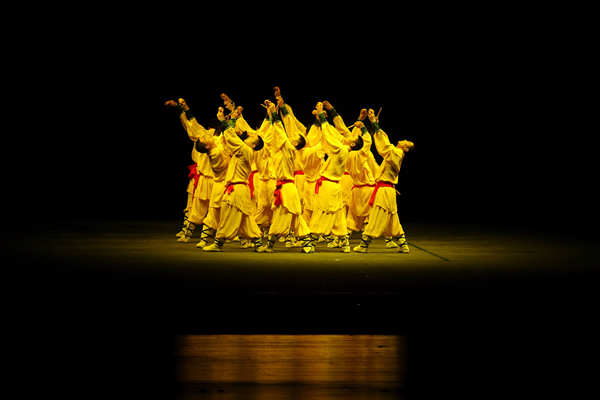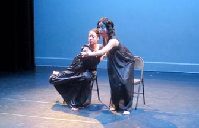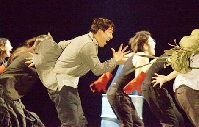Kung Fu reality check
By Chen Nan ( China Daily ) Updated: 2014-01-24 11:07:33
You can learn real Chinese kung fu in 90 minutes. You will learn nothing about fighting, but you will open your mind to the story of the nine virtues of man's spiritual struggle: purity, sutra, diligence, spirit, listening, shape, devotion, serenity and paradise. That's the promise of the show Kung Fu Revelations: 9 Scrolls, by Kung Fu Star Performing Group of China Poly Agency. Yu Yang, the agency president, came up with the idea and selected the young kung fu masters after visiting more than 100 of the best martial-arts schools in China.
He put this group together in 2003 to shatter some stereotypes.
"Chinese kung fu is neither stage combat nor fighting. It originates from Chinese culture, which we illustrate in the nine chapters in the show," says Yu.
The result is a combination of contemporary dance and kung fu, along with poems projected on screens to explain each chapter, with lines like "each type of spiritual catastrophe originates within the self" and "the essence of kung fu is morality, truth, energy and harmony".
Since the show made its debut in June 2008 at Beijing's Poly Theater, it has toured throughout Asia, Europe, Australia and North America-including a six-month run in Las Vegas in the United States.
Now, the show moves to its next stage. After three nights in Beijing, the show bid farewell to the capital and went to Luoyang, Henan province. Starting from April, it will be staged at Luoyang's Traditional Chinese Study Institute in a specially built theater, with 6,000 shows slated over the next 15 years.
"We adopt the format of a Broadway show, which has good artistic quality and runs for a long duration," says Yu. He's not worried about selling tickets, priced from 180 yuan ($30) to 2,000 yuan. He says more than 80 million tourists visited Luoyang in 2013, including 8 million from abroad.
Situated on the central plain of China, Luoyang is one of the cradles of Chinese civilization. As the capital of China for 1,500 years, it attracted many great poets and writers in ancient China who left grand works, including the Book of Wisdom and Han History.
|
|
|
|
|
|
|
|
























 Raymond Zhou:
Raymond Zhou: Pauline D Loh:
Pauline D Loh: Hot Pot
Hot Pot Eco China
Eco China China Dream
China Dream China Face
China Face





